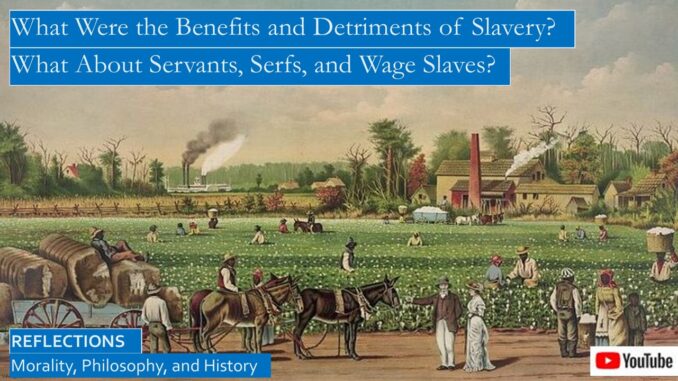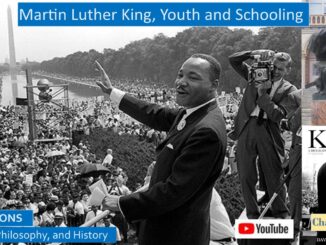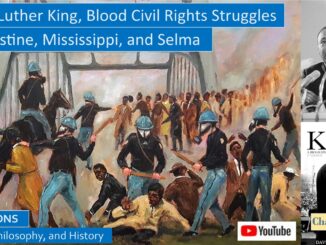
Today we will ask: What were the main benefits of slavery for the enslaved? And there were benefits. Were slaves safe from lynchings because they were considered to be property?
What were the main detriments of slavery for the enslaved? Why was it illegal to teach slaves how to read and write?
Is chattel slavery, where the slave is the property of the owner, the only type of slavery? Are servants a type of slave? Are minimum wage employees who are not earning a living wage a type of wage slave?
Powerpoint Script with Book Links:
https://www.slideshare.net/BruceStrom1/benefits-and-detriments-of-slavery-ss-in-the-deep-southpdf
This YouTube video: https://youtu.be/gVywN_xc32M
BENEFITS AND DETRIMENTS OF SLAVERY IN THE DEEP SOUTH
In July 2023, the state of Florida instructed teachers to teach children that slaves did gain some benefits before the Civil War. When asked, Governor Ron DeSantis suggested that some slaves did receive vocational training that benefited them, mentioning blacksmiths. So, we can also ask, What vocational or educational opportunities were open for slaves to improve themselves?
Slaves did indeed receive some benefits under slavery. For example, for them to work for their masters, their masters would have to feed them. Free food is indeed a benefit, though it will not matter much unless there are other benefits. So, we will simply answer these questions.
To adequately answer these questions, we need to better understand what it means to be a slave, and the various types of slaves. We know there were numerous slaves in the Roman Empire, but as the empire collapsed, over the centuries slaves became less common, and were replaced by serfs. Serfs were allowed some freedoms, they were allowed to marry, they were technically not owned by anyone, but serfs farmed the land and were not allowed to leave the noble’s manor in which they were born. Serfs were very poor, could they be considered slaves?
What about modern-day workers who earn only the minimum wage, who do not earn enough to feed their families with dignity, who are not paid a living wage? Should they be considered to be a wage slave?
What is certain is that the practice of slavery varied by culture. What distinguished the system of slavery in the Deep South from the many forms of slavery in the ancient world? Slavery in the Deep South was racial slavery, and the blacks were seen as inferior to whites, divinely condemned to servitude.
These were the general categories of slaves in all slave societies, both ancient and modern:
- Household servants, and small farm hand slaves. This was often a milder form of slavery, sometimes servants were treated like a part of the family. But in the Deep South, blacks could never truly be treated as part of the family since blacks were an inferior race.
- Concubines, both consenting and unwilling, were often captured in war. Sexual abuse and rape of female slaves is a problem for all cultures with slaves. Raping black slaves was as rampant as it was profitable on Southern plantations.
- Least numerous: Independent city slaves who were tradesmen. Often, they were allowed to retain some of proceeds from their trade and buy their freedom. This type of slave was less common in the Deep South, more common in ancient Greece and Rome.
- Most numerous: Field hands for large plantations, worked under overseer’s whip. Since the slave-owner had minimal contact with these slaves, their lives could be quite harsh.
- Slaves who worked in mines: this was usually a death sentence.
In most slave auctions, modern and ancient, woman slaves were sold nude. After all, the buyer has the right to inspect the property which he is buying.
MAJOR BENEFIT OF SLAVERY TO THE ENSLAVED IN THE DEEP SOUTH
There was one very real benefit of slavery to the enslaved in the Deep South. Before the Civil War, slaves were far less likely to be lynched or killed than were freed slaves after the war. The reason for this was simple: it is illegal to damage someone’s property, and slaves were extremely valuable. Slaves were the most valuable asset class in America before the Civil War. Before the Civil War, a slave was worth as much as an economy car is worth today.
The neighbors of a slave master couldn’t kill his slave, but he and his overseers could. The runaway slave Frederick Douglass, in his youth, witnessed an overseer killing an unruly slave. And it was common for a master to beat his slaves, Frederick Douglass witnessed many such beatings, often to simply satisfy the sadistic pleasure of a cruel overseer.
After the Confederacy lost the Civil War, and especially after Reconstruction, lynchings of blacks became commonplace. Ida B Wells was a brave black journalist who risked her life to report on many of the lynchings of her day. Through her efforts and those of WEB Du Bois, editor of the Crisis, the NAACP magazine, they documented over six thousand lynchings through newspaper accounts, the actual figures were likely over ten thousand. There were gruesome lynchings scheduled for Sunday afternoons, so the faithful could attend church services before. It was rare for lynchers to be charged for murder in the Deep South, and even rarer for Southern juries to convict them.
Ida B Wells, Journalist, Brave Woman, and Anti-Lynching Activist
http://www.seekingvirtueandwisdom.com/ida-b-wells-journalist-brave-woman-and-anti-lynching-crusader/
https://youtu.be/sLDHs0AigvY
SLAVERY AND VOCATIONAL TRAINING IN THE DEEP SOUTH
Was the average slave able to take advantage of vocational training, so they could become blacksmiths, or other occupations? After the Civil War, the freed slaves could attend black colleges, often tuition-free, such as the Hampton Institute and the Tuskegee Institute, and most black colleges offered vocational education as part of the curriculum. Before the Civil War few black schools existed in the Deep South, whatever training was at the whim of the plantation owner, and whipping rather than education was what was employed to increase production on most plantations.
The vast majority of slaves were field slaves, there was no reason to train them to do anything but pick cotton or some other crop. After the war, most vocational training for blacks centered on agriculture and the building trades, which likely included blacksmiths.
Rarely were slaves taught how to read and write. If a slave were literate, he could then read the abolitionist literature and start plotting his escape to the North. In fact, as a consequence of the Nat Turner slave rebellion of 1831, it was illegal to teach a slave how to read and write. Nat Turner was both literate and a preacher, and inspired by a solar eclipse he interpreted as a divine sign, he led an armed rebellion that murdered over sixty whites.
What were the political consequences?
- More state legislatures prohibited teaching slaves and freed blacks how to read, black schools in the North and South were destroyed by mobs.
- Black religious meetings had to be supervised by a licensed white minister.
- Movements and public meetings of blacks were restricted further.
- Many abolitionists saw Nat Turner as a black hero.
- Nat Turner’s Rebellion strengthened the resolve of slave owners to defend slavery, black slaves suffered harsher treatment, even demonized.
- Nat Turner’s rebellion strengthened the prejudices of those who feared blacks.
We discussed Nat Turner’s rebellion in our video:
Three Generations of Leading Black Leaders, Frederick Douglass, Booker T Washington, and WEB Du Bois
https://seekingvirtueandwisdom.com/three-generations-of-leading-black-leaders-frederick-douglass-booker-t-washington-and-web-du-bois/
https://youtu.be/DAEg463i-Tc
MAJOR DETERIMENTS OF SLAVERY IN THE DEEP SOUTH
Many slaves in the Deep South desperately sought to run away, many risked their lives and the lives of their children to escape through the informal Underground Railroad smuggling them to freedom in the North. Often, they fled to Canada to escape the slave catchers who pursued them.
Why were slaves so eager to escape? Aside from constant whippings and abuse, often slave families were broken apart on the auction block. In the seaboard states like Virginia, it was more profitable to breed slaves for plantations in the Black Belt Southern states, including Georgia, Alabama, and Mississippi, than it was to grow crops, often children were torn from their families and sold individually.
EXAMPLES FROM SLAVE NARRATIVES
What were the benefits and detriments of slavery in the Deep South? There were regional differences in the institution of slavery which are revealed when we review the best-known slave narratives of Frederick Douglass, who escaped from slavery in the 1830’s Abolition Era, and Booker T Washington and Augustine Tolton, who were emancipated at the end of the Civil War.
Frederick Douglass was born a slave in Maryland. He was separated from his mother as an infant, his mother’s owner lived a dozen miles away, he only saw her four or five times, and only at night. His mother was likely raped by a white slave owner, he did not know who his father was. He remembers how slaves “were often savagely whipped and sexually abused; white masters could do as they wished with their property. Slaves were given no beds, they slept side by side on the cold, damp floor, covered by miserable blankets.” Sometimes black children were fed at troughs like hogs.
Frederick Douglass remembers: At the farms he worked on when he was young, “men and women slaves received, as their monthly ration, eight pounds of pork, or its equivalent in fish, and one bushel of corn meal. Their yearly clothing consisted of two coarse linen shirts, one pair of linen trousers, one jacket, one pair of winter trousers, made of coarse negro cloth, one pair of stockings, and one pair of shoes. . . The children unable to work had neither shoes, stockings, jackets, or trousers; their clothing consisted of two coarse linen shirts per year. When these wore out, they went naked until next allowance day,” even in the winter.
Frederick Douglass Tells Us About His Life as a Slave in his Autobiography
http://www.seekingvirtueandwisdom.com/frederick-douglass-tells-us-about-his-life-as-a-slave-in-his-autobiography/
https://youtu.be/7VkzhyNnuQk
Like Frederick Douglass, Booker T Washington was born a field slave in southwest Virginia, the family lived in a one-room cabin, everyone sleeping on the floor. He never knew who his father was, he suspected he was one of the white masters. Unending toil, dawn to dusk, was their life, the life of a slave, until his family was emancipated at the end of the Civil War.
Booker T Washington was an illiterate slave, after Emancipation he learned how to read and attended the Hampton Institute. He impressed the headmaster, who recommended him to be the first headmaster of the Tuskegee Institute. He was the leading black leader of his era; he raised funds from Northern business tycoons to fund the impressive expansion of Tuskegee Institute.
Up From Slavery: Autobiography of Booker T Washington
http://www.seekingvirtueandwisdom.com/up-from-slavery-autobiography-of-booker-t-washington/
https://youtu.be/yxDnJ6sBoJc
Augustine Tolton was born an illiterate field slave in Kentucky. Slaves of Catholic owners sometimes had more dignity, their marriages were recognized by the church and their births were recorded in the parish registry. However, they were still slaves, and his biography records how some families were broken up when the master’s estate was settled, although parents and their children were kept together.
After the Civil War, Augustine Tolton overcame daunting obstacles to attend seminary in Rome and be ordained as the first ex-slave black Catholic priest in America, becoming literate in four languages, English, German, Latin, and Koine Greek, shepherding a parish first in his adopted city, Quincy, Illinois, then in Chicago.
Father Augustine Tolton, From Slave to Priest
http://www.seekingvirtueandwisdom.com/father-augustine-tolton-from-slave-to-priest/
https://youtu.be/dZbzWJkAf5k
Slavery did not end with the Civil War. The Reconstruction Amendment abolishing slavery includes a loophole for convict labor. The Deep South took advantage of this, enslaving blacks picked up for vagrancy and bogus infractions, farming them out as slave labor to plantations, mines, and other businesses. Many blacks died under concentration labor camp conditions. Peonage was not substantially abolished until World War II under FDR’s administration.
Slavery By Another Name, Convict Labor in the Jim Crow Deep South
https://seekingvirtueandwisdom.com/slavery-by-another-name-convict-labor-in-the-jim-crow-deep-south/
https://youtu.be/2TCXcEpohaM
We also reflected on how the Jewish Old Testament and rabbis, the Stoic Philosophers, and Christian Church Fathers, over the centuries, sought to alleviate the working conditions and improve the dignity of slaves and servants.
Teachings about Slavery in the Bible and by the Early Church Fathers
http://www.seekingvirtueandwisdom.com/teachings-about-slavery-in-the-bible-and-by-the-early-church-fathers/
https://youtu.be/poyvJajCXnE
Southerners in the Secession Conventions where the Confederate states seceded from the Union proudly proclaimed that they would be fighting the Civil War specifically to protect the institution of slavery, and that the black race was inferior to the white race.
We Fought the Civil War to Preserve Slavery, Confederate Leaders Proclaimed
https://seekingvirtueandwisdom.com/we-fought-the-civil-war-to-preserve-slavery-confederate-leaders-proclaimed/
https://youtu.be/vBt81M6EWk0
DISCUSSING THE SOURCES
The slave narratives we reviewed are highly readable and are interesting because they provide a glimpse into the daily lives of those who lived in a very different time.
WEB Du Bois was born in Massachusetts during Reconstruction and was one of the first blacks to earn a PhD from Harvard. His history, Black Reconstruction, though it was sidelined and mostly ignored when it was written, eventually it changed the narrative on Reconstruction during the Civil Rights Era of the Sixties. He quotes from the Congressional Record many brutalities black freed slaves suffered during Reconstruction. His essays, Soul of Black Folk, includes an essay on sharecropping, the plantation labor system that replaced slavery that, like serfdom, protected the black family, although it left black laborers destitute, and bound to the land by mountains of debt.
Refuting the Lost Cause: Black Reconstruction by WEB Du Bois
http://www.seekingvirtueandwisdom.com/refuting-the-lost-cause-black-reconstruction-by-web-dubois/
https://youtu.be/JeRCM4PAqPk
History of History of WEB Dubois’ Black Reconstruction, Challenging Lost Cause Myth and Dunning School
https://seekingvirtueandwisdom.com/history-of-history-of-web-dubois-black-reconstruction-challenging-lost-cause-myth-and-dunning-school/
https://youtu.be/CK4V3e-TPFU
WEB Du Bois: The Souls of Black Folk, Personal Essays From Reconstruction Era
http://www.seekingvirtueandwisdom.com/web-dubois-souls-of-black-folk-fighting-for-dignity/
https://youtu.be/x212gx1lNIA
WEB Du Bois, Souls of Black Folk, Essays on Alexander Crummel, Black Episcopal Priest, and Sharecropping
https://seekingvirtueandwisdom.com/web-dubois-souls-of-black-folk-essays-on-alexander-crummel-black-episcopal-priest-and-sharecropping/
https://youtu.be/J3TnQyig6Nk
Yale University has posted their two undergraduate classes on black history on YouTube, they were influenced by WEB Du Bois’ Black Reconstruction. We have summarized these twenty-four lectures in five shorter videos.
American Slavery and the Abolitionists: Yale Lecture Notes
http://www.seekingvirtueandwisdom.com/american-slavery-and-the-abolitionists-yale-lecture-notes/
https://youtu.be/kmLg8CDjOOY
Stories of How Slaves Helped the Union Win the Civil War: Yale Lecture Notes
http://www.seekingvirtueandwisdom.com/stories-of-how-slaves-helped-the-union-win-the-civil-war-yale-lecture-notes/
https://youtu.be/89ulb20cy8Q
Post-Civil War Reconstruction and Redemption History, Yale Lecture Notes
http://www.seekingvirtueandwisdom.com/post-civil-war-reconstruction-and-redemption-history-yale-lecture-notes/
https://youtu.be/f5nPNnvDBCY
American Civil Rights History: Yale Lecture Notes
http://www.seekingvirtueandwisdom.com/american-civil-rights-history-yale-lecture-notes/
Early Civil Rights Era, Through World War II Era: Yale Lecture Notes
https://youtu.be/weGmYOe0Lyg
Civil Rights Era, Sixties and Beyond: Yale Lecture Notes
https://youtu.be/GQesHoV5IdI
The book Bloody Shirt contains individual stories of how difficult it was for Northern troops to protect the civil rights and lives of freed slaves in the defeated Southern states.
Chaos of Reconstruction, Terror After the Civil War
https://seekingvirtueandwisdom.com/chaos-of-reconstruction-terror-after-the-civil-war/
https://youtu.be/ZEX050eTn38
Terror During Reconstruction, White League Confronts General Longstreet and Union Army
https://seekingvirtueandwisdom.com/terror-during-reconstruction-white-league-confronts-general-longstreet-and-union-army/
https://youtu.be/bF3w2RrSaM0
The book Bloody Shirt contains individual stories of how difficult it was for Northern troops to protect the civil rights and lives of freed slaves in the defeated Southern states.
There are direct and indirect correlations between the segregationist Jim Crow legislation and the persecution of the Jews under the German Nazi regime.
How the Racist Jim Crow Laws Served as Precedent for the Nazi Nuremberg Race Laws
http://www.seekingvirtueandwisdom.com/how-the-racist-jim-crow-laws-served-as-precedent-for-the-nazi-nuremberg-race-laws/
https://youtu.be/_td3jPGD5TI
Comparing Martin Luther King’s Letter From the Birmingham Jail with Hannah Arendt’s The Banality of Evil
http://www.seekingvirtueandwisdom.com/comparing-martin-luther-kings-letter-from-the-birmingham-jail-with-hannah-arendts-the-banality-of-evil/
https://youtu.be/PqFAUEXbi8k
WEB Du Bois, co-founder of the NAACP, was the leading black leader in the era following Booker T Washington. His life spanned the years from Reconstruction, during the two World Wars, and ending at the start of the Civil Rights Era of the Sixties.
Autobiography of WEB Du Bois: His Youth, School Years, and Early Career
https://seekingvirtueandwisdom.com/autobiography-of-web-dubois-his-youth-and-school-years/
https://youtu.be/N2ZqixUxPmo
Tensions Between WEB Du Bois and Booker T Washington, Accommodation or Activism?
https://seekingvirtueandwisdom.com/tensions-between-web-du-bois-and-booker-t-washington/
https://youtu.be/Ntjl4xqQSfw
WEB Du Bois and the NAACP, Continuing the Fight For Civil Rights
https://seekingvirtueandwisdom.com/web-du-bois-and-the-naacp-continuing-the-fight-for-civil-rights/
https://youtu.be/MNhkq69CIfo
Was WEB Du Bois a Communist? The Later Years of WEB Du Bois
https://seekingvirtueandwisdom.com/was-web-du-bois-a-communist-the-later-years-of-web-du-bois/
https://youtu.be/YwgrKvIjoc0




Be the first to comment